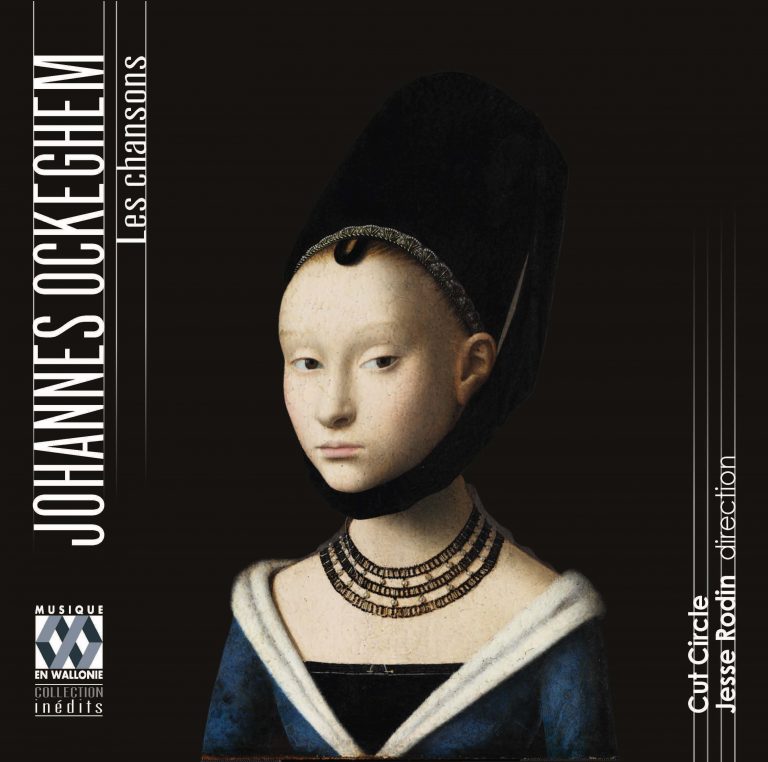
cutcircle.org | medieval.org
Musique en Wallonie
2020
Johannes Ockeghem: The Songs (Les Chansons)
/ Cut Circle
[15.9.2020]

cutcircle.org |
medieval.org
Musique en Wallonie
2020
Disc One
1. Nymphes des bois/Requiem (à 5) — Josquin des Prez
2. Ma maistresse
3. Presque transi
4. L'autre d’antan
5. Ma bouche rit
6. ¿Qu’es mi vida, preguntays? (à 4)
7. Baisies moy
8. D'ung aultre amer
9. Quant de vous seul
10. Je n’ay dueil (à 3)
11. Les desléaulx
12. Tant fuz gentement resjouy
Disc Two
1. S'elle m’amera/Petite camusette (à 4)
2. Je n’ay dueil (à 4)
3. Aultre Venus
4. Fors seulement l'attente
5. Fors seullement contre/Fors seulement l’attente
6. O rosa bella (à 2)
7. La despourveue
8. Se vostre cuer
9. Prenez sur moy
10. Ung aultre l'a
11. Il ne m’en chault
12. Mort, tu as navré/Miserere (à 4)
Sonja DuToit Tengblad — Soprano
Clare McNamara — Mezzo-Soprano
Jonas Budris — Tenor
Lawrence Jones — Tenor
Steven Soph — Tenor
Bradford Gleim — Baritone
Paul Max Tipton — Baritone
Sumner Thompson — Baritone
Jesse Rodin — Director
Bradford Gleim — Artistic Advisor
Intimacy, intensity, passion—this album explores the unfamiliar
idea that fifteenth-century songs might cause us to sigh, weep, or
laugh out loud. In bringing to life a world in which crying in public
was not just acceptable but required, we have to take seriously the
crushing despair of a line like “My only sorrow is that I am not
dead,” or the undisguised sarcasm of “This is how she
chopped and cooked me up.”
In Johannes Ockeghem’s roughly two-dozen songs we find not only
unparalleled compositional prowess, but feelings that range from
happiness to loss, anger to despair, and bitterness to merriment. The
album’s all-vocal, fully texted, close-miked performances are
rooted in a flexible vocal technique that aims to capture the
music’s technical brilliance and emotional depth.
[15.9.2020]
medieval.org Remarks
http://www.medieval.org/emfaq/cds/remarks.html
16 OCtober 2020
Todd M. McComb
———
Releases
tend to come in bursts in this area, but even after all these years, I
have to note surprise in seeing a second Ockeghem Complete Songs
production come not only so closely on the heels of the first (in
decades), but at both having been recorded in Massachusetts mostly in
2018.... I'm still partial to the approach taken
by Blue Heron,
whose second volume is due to be released in 2022, but that
by Cut Circle is
impressive in its own way: For one thing, the latter is already
complete — albeit with a tentatively attributed item slated to
appear on a future, more general program of anonymous songs (that also
sounds welcome) — while hopefully the virus situation won't
derail the former. (Glancing at their web site in preparation for these
comments suggests that Blue Heron is still in business....).
And
Scott Metcalfe's approach for Blue Heron does involve some instruments
at times, although virtually no doubling, and with the vast majority of
parts (at least so far) performed by a changing selection of voices,
while that by Jesse Rodin for Cut Circle is entirely vocal. The latter
comes off a little dogmatically, despite the disclaimer to that end,
but is certainly worthwhile, particularly as it's conceived with all
voices singing the texts at all times (rather than the simple vowels
that some groups use). More significantly among the differences,
though, even as it's not specifically discussed in the accompanying
materials, is tuning: Cut Circle is tuned in mean-tone, and always
sounds grating to me when their album starts, but I warm up to it with
exposure.... Actually, their tuning is very good, very precise... which
seems kind of odd to hear for mean-tone vocal music, but I can pretend
I'm listening to the Buxheimer Orgelbuch sometimes....
So what should it be? I find the sort of post-Pythagorean tuning by
Blue Heron truly buoyant in comparison, with a lively rhythmic quality
that emerges from the more incisive cadential phrasing.
In
contrast, Cut Circle sounds more like later music, with phrasing a bit
more blunted at times, the music generally more extended &
ponderous... suggesting those "points of imitation" that would become
so ubiquitous. It's a quality interpretation, though, and clearly
projects a more future-oriented vision of Ockeghem, although note that
cadences in thirds wouldn't even be definitive yet for Josquin.... It's
a kind of 16th century vision of Ockeghem, but his music does hold up
to it: Obviously as the Buxheimer remark suggested, mean-tone was not
unknown in this period, and even as a prestigious composer of polyphony
like Ockeghem presumably thought in the older technical context, his
music works remarkably well this way. (That's unlike, say, some of
Dufay's music which totally falls apart outside of a Pythagorean scheme
— even as some was also successfully adapted for new contexts.
One might also consider Ockeghem's works created to be sung in more
than one mode: Perhaps that's analogous, and it wouldn't surprise me if
tuning ambiguities were consciously considered too....)
And
actually, the songs performed in a coarser or more rustic manner are
the strength of this interpretation (perhaps ironically, evoking the
later Parisian chanson at times?) — so it would then probably be
worthwhile to figure out exactly which songs sound most idiomatic in
mean-tone (although I haven't attempted any such specific tracking to
this point myself). Anyway, I hope that this release also signals that
neglect of 15th century chansons will be receding into the past more
generally....
remarks on Blue Heron, OCKEGHEM Songs, vol. 1
[29.4.2020]